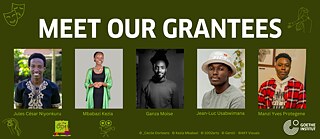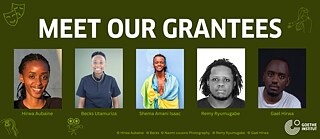Grantees 2024
Meet the grantees from our "Open Call for Artistic Projects" 2024
Following up on the success of last years Open Call for Artistic Projects, we were very excited to take it into another round at the beginning of this year. After receiving a huge number of applicants and looking at all the proposals with the help of an external jury, we are glad to finally be able to announce the new grantees!
Within this year, all of them will produce their projects and premiere it at our insitute. Stay tuned for a diverse range of projects and also take time to meet some artists that are new to our network.
Jules César Niyonkuru: This project combines visual art, musical and theater play. Adapted from the story “Histoire Générale des murs” by Sinzo Aanza, it tackles the theme of physical and psychological walls which surround us, protect us and isolate us from others or even ourselves. But what would happen if these walls came down, exposing us to society?
Mbabazi Kezia: "Me and Home: Navigating Rwandan Identity in Uganda," is a deeply personal narrative and innovative use of visual storytelling. Mbabazi Kezia experiments with paintings to convey the emotional depth of identity exploration. By centering on the artist’s journey, the project offers a new perspective, fostering empathy and sparking dialogue about belonging and cultural heritage in multicultural societies.
Ganza Moise: “Ako kantu" is a satirical short film in the mockumentary genre. It follows a disgraced former journalist who became a youtuber and one day follows a local thief in the slums of Kigali. What background do we expect a thief to have and where do our expectations lead us the wrong way? Ako kantu looks and feels like a normal day in life. But it makes us question what is actually real.
Jean Luc Usabwimana: The "Kina mwana" exhibition is dedicated to promoting, educating and perserving the right of children to play through visual art. It adresses the challenges, faced by children in Rwanda stemming from the aftermath of the 1994 genocide against Tutsi and nowadays technology addiction. As these have dimished children´s leisure time negatively, affecting their creativity, critical thinking, health and social development.
Manzi Yves Protegene: “Lost in the Mists of Antiquity" is a comic book that tells the captivating story of Ngabo, a modern-day teenager who finds himself mysteriously transported back in time to an ancient era. The story seamlessly blends elements of modern society like social media and urban settings with traditional Rwandan folklore and customs creating a fusion of present and past.
Hirwa Aubaine: "Persona" is a journey into the depths of human consciousness. Exploring the landscape of the human mind through contemporary dance, poetry and music. The choreography serves as a mirror, reflecting the emotions and unseen battles, embodying the internal conflicts that define the human experience. Each movement is a testament to resilience and vulnerability, navigating thoughts and emotions that shape our perception of reality.
Becks Utamuriza: “Not a choice” is a short film about awareness of body expression and emotional and verbal abuse. It reflects on body expression and feelings, bringing out the challenges of sexual orientation and pain, experienced through discrimination. Telling a Rwandan true story about a young transgender woman who was born in a man’s body and a transgender man, born in a woman’s body.
Shema Amani Isaac: “Ubutumwa” is a dance and theater piece which interprets the struggles and the life of the artist’s relatives before and during the 1994 Genocide against Tutsi. The lives they would be living now if they had not been killed. It also includes a documentary, telling survivers stories and giving insides on the artists journey.
Remy Ryumugabe: In Rwandan society, discussions surrounding bodies, nudity, and sexuality are often fraught with controversy and misunderstanding. The "Unclothed Echoes" exhibition seeks to challenge these entrenched attitudes through a series of photographs. By deliberately concealing sex, the project prompts viewers to look beyond surface assumptions and engage with the complexities of the human form.
Gaël Hirwa: “Umutima w’Iraba” is a serial fictional comic book project based on historical events that occurred in Rwanda’s Pre-colonial era. Notably the Rucunshu coup d’etat, where two factions of the kingdom fought for the throne. The aim of “Umutima w’Iraba” is to share Rwanda’s vanishing history in a fun and consumable format.
Within this year, all of them will produce their projects and premiere it at our insitute. Stay tuned for a diverse range of projects and also take time to meet some artists that are new to our network.

Jules César Niyonkuru: This project combines visual art, musical and theater play. Adapted from the story “Histoire Générale des murs” by Sinzo Aanza, it tackles the theme of physical and psychological walls which surround us, protect us and isolate us from others or even ourselves. But what would happen if these walls came down, exposing us to society?
Mbabazi Kezia: "Me and Home: Navigating Rwandan Identity in Uganda," is a deeply personal narrative and innovative use of visual storytelling. Mbabazi Kezia experiments with paintings to convey the emotional depth of identity exploration. By centering on the artist’s journey, the project offers a new perspective, fostering empathy and sparking dialogue about belonging and cultural heritage in multicultural societies.
Ganza Moise: “Ako kantu" is a satirical short film in the mockumentary genre. It follows a disgraced former journalist who became a youtuber and one day follows a local thief in the slums of Kigali. What background do we expect a thief to have and where do our expectations lead us the wrong way? Ako kantu looks and feels like a normal day in life. But it makes us question what is actually real.
Jean Luc Usabwimana: The "Kina mwana" exhibition is dedicated to promoting, educating and perserving the right of children to play through visual art. It adresses the challenges, faced by children in Rwanda stemming from the aftermath of the 1994 genocide against Tutsi and nowadays technology addiction. As these have dimished children´s leisure time negatively, affecting their creativity, critical thinking, health and social development.
Manzi Yves Protegene: “Lost in the Mists of Antiquity" is a comic book that tells the captivating story of Ngabo, a modern-day teenager who finds himself mysteriously transported back in time to an ancient era. The story seamlessly blends elements of modern society like social media and urban settings with traditional Rwandan folklore and customs creating a fusion of present and past.

Becks Utamuriza: “Not a choice” is a short film about awareness of body expression and emotional and verbal abuse. It reflects on body expression and feelings, bringing out the challenges of sexual orientation and pain, experienced through discrimination. Telling a Rwandan true story about a young transgender woman who was born in a man’s body and a transgender man, born in a woman’s body.
Shema Amani Isaac: “Ubutumwa” is a dance and theater piece which interprets the struggles and the life of the artist’s relatives before and during the 1994 Genocide against Tutsi. The lives they would be living now if they had not been killed. It also includes a documentary, telling survivers stories and giving insides on the artists journey.
Remy Ryumugabe: In Rwandan society, discussions surrounding bodies, nudity, and sexuality are often fraught with controversy and misunderstanding. The "Unclothed Echoes" exhibition seeks to challenge these entrenched attitudes through a series of photographs. By deliberately concealing sex, the project prompts viewers to look beyond surface assumptions and engage with the complexities of the human form.
Gaël Hirwa: “Umutima w’Iraba” is a serial fictional comic book project based on historical events that occurred in Rwanda’s Pre-colonial era. Notably the Rucunshu coup d’etat, where two factions of the kingdom fought for the throne. The aim of “Umutima w’Iraba” is to share Rwanda’s vanishing history in a fun and consumable format.